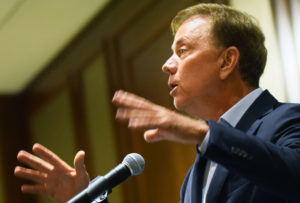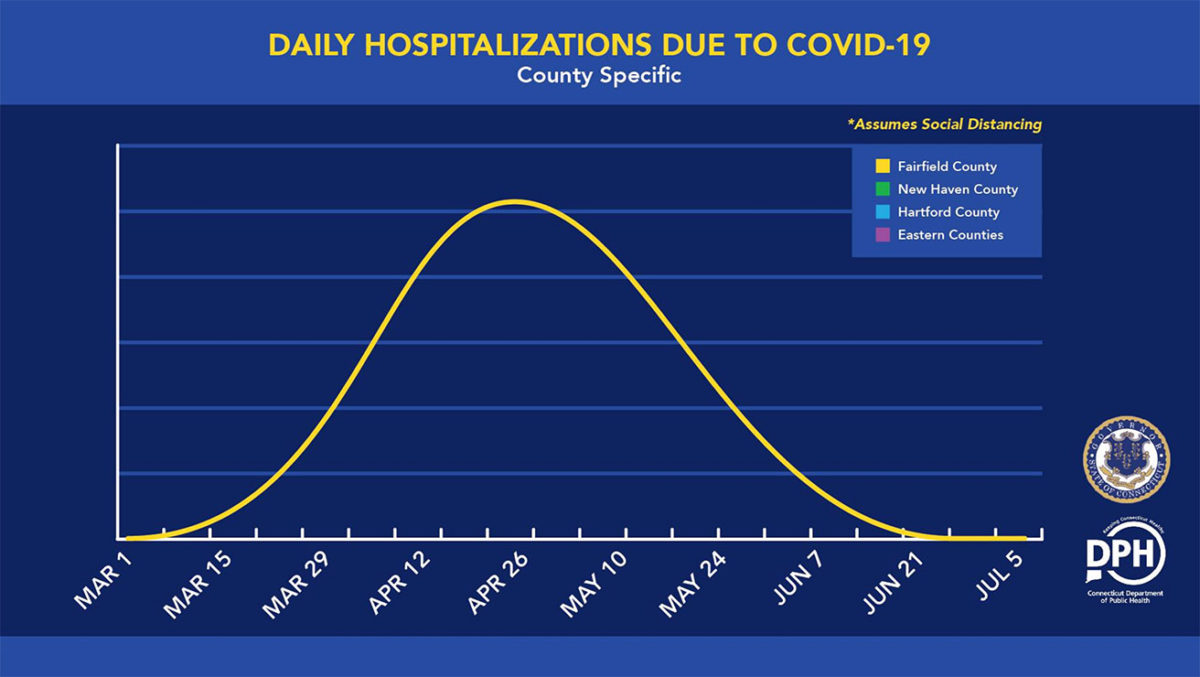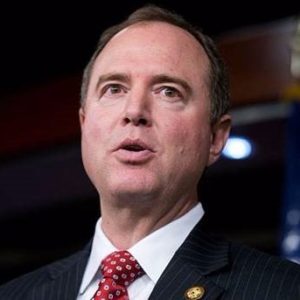Connecticut”™s COVID-19 numbers continue to rise, with 1,090 new positive test results and another 19 fatalities, bringing the state”™s death toll to 131, Gov. Ned Lamont announced this afternoon.

The positive results came from 1,715 tests, the governor said, adding that another 82 people have been hospitalized, bringing that total to 909.
All told, 20,115 tests have been conducted, with 4,914 positive results.
Fairfield County still leads the state with 2,716 positive tests and 75 deaths.
At today’s briefing, Lamont unveiled a set of models indicating that Fairfield County will see a peak around April 26, after which incidents will decline through the first week of July. New Haven County will see its surge about two weeks after April 26, followed by Hartford County and eastern Connecticut, each of which will see less incidents, according to the model, due to social distancing efforts, better preparation and less population density.
The state is now estimating that it may need as many as 12,000 hospital COVID-19 dedicated beds at the peak, he said. At this point, there are about 7,000 available beds overall, 4,000 of which are COVID-ready. With the state”™s acute care hospitals having increased capacity by about 50%, Lamont said a further push could result in an additional 3,000 beds, and that retrofitting available nursing home space could add another 1,000 beds.
 Governmental mandates and social distancing guidelines will likely remain in place for several months, the state”™s COO, Josh Geballe, said, as health officials continue to try and navigate what is terra incognita. Getting past the peak “doesn”™t mean that the next day life goes back to normal,” he said. “A significant portion of the population will not have had COVID-19, so if we take the restrictions off too quickly we could have another flare-up.”
Governmental mandates and social distancing guidelines will likely remain in place for several months, the state”™s COO, Josh Geballe, said, as health officials continue to try and navigate what is terra incognita. Getting past the peak “doesn”™t mean that the next day life goes back to normal,” he said. “A significant portion of the population will not have had COVID-19, so if we take the restrictions off too quickly we could have another flare-up.”
Referring to the models ”“ which he cautioned may paint a better or worse picture than what will ultimately take place ”“ Lamont said it seems likely that schools will “go way past April 20th,” the tentative date for reopening that remains in place.
On a more positive note, the governor said Connecticut has become one of the first states to get a new 15-minute coronavirus test in operation, at Stamford Hospital. Last week, the U.S. Food and Drug Administration approved that test, made by Chicago”™s Abbott Laboratories.
In addition, Stamford genomics-testing company Sema4 will be running 250 tests by tomorrow, with the hope that by next week that number will increase to 1,000 to 2,500 per week, Lamont said.
As for ventilators, Connecticut has a little over 1,000, 50 of which came from the national strategic stockpile, while New York City received about 4,000. Lamont said that was a matter of growing concern, as Dr. Deborah Birx, the White House coronavirus response coordinator, said yesterday that Connecticut could be one of the nation”™s next hot spots.
“Southern Connecticut is (already) one of those hot spots, and has been for some time,” the governor said.
AID FOR NURSING HOMES
Earlier today, the governor announced that, effective immediately, the state”™s 213 nursing homes are receiving a 10% across-the-board increases in Medicaid payments. Those funds will be applied toward employee wages ”“ including staff retention bonuses, overtime, and shift incentive payments ”“ and toward new costs related to screening of visitors, personal protective equipment, and cleaning and housekeeping supplies.
The 10% funding increase runs from April 1 through June 30, with an initial payment of $11.6 million scheduled to be received by nursing homes on April 7. The three-month increase is expected to total $35.3 million.
Long-term care facilities that propose to be designated by the Department of Public Health (DPH) to specialize in care for residents with COVID-19 will be eligible for $600 per-day payments for each person served. That rate is more than double the average daily Medicaid payment rate, according to the governor”™s administration.
The state is also offering to assist with startup costs and to make the same $600 per-day payment to facilities that are designated by DPH as suitable to be re-opened for the purpose of serving residents with COVID-19 and who need nursing home level of care.
For further information about the Medicaid rate increases for all nursing homes, visit www.ct.gov/dss/nursinghomereimbursement.
VOLUNTEERS SOUGHT
Also today, the governor and a number of state officials and nonprofit providers urged Connecticut residents to consider taking on a volunteer role in their communities to help respond to the COVID-19 crisis. While the state already has in place a campaign seeking volunteers who have health care experience, today”™s appeal is for volunteers for other services at many different types of providers, such as food banks, deliveries to the elderly, shelters, and more.
“During times like this, it is critical that we come together as a community ”“ as a family ”“ and support our neighbors in this response effort,” Lamont said. “Connecticut residents and businesses have been incredibly generous in offering to do what they can to meet the needs of our state at this challenging time. Our frontline providers at food banks, meal delivery services, and shelters need extra help right now, and that is why we are asking for more volunteers to step forward. The way we”™ll get through this public health emergency is by working together.”
Volunteers from the general public will be matched with a community provider in need. Here are the basics:
- Volunteers must be 18 or older, and should not volunteer if at risk or compromised. Those who are immuno-compromised, over 60, showing symptoms of COVID-19, or live with or care for someone in any of those categories should avoid being in public, including for volunteer efforts. Please stay safe, stay home.
- Volunteers do not need to be health care workers. In addition to calling on physicians, nurses and other medical professionals who may be retired, the state needs community members to help out at food banks, food deliveries to the elderly, and at shelters in a number of ways.
- For those who do have a background in health care, the state”™s medical community has specific needs at this time. Hospitals have advised the state that they have a high need for critical care nurses and repository therapists.
- Every effort is being made to keep volunteers safe. The state and all of the organizations involved are working hard to make sure that everyone helping out can do so as safely as possible. If any volunteers have concerns, they are strongly urged to ask about the safety protocols of the organization they are volunteering.
- Volunteers will be sent where they are most needed and feel most comfortable. The volunteer process is centralized so that the state and participating organizations have a clear picture of everyone who can help, and everything that is needed. That way, volunteers can be matched with an opportunity that is most in need of that person”™s skillset.
“On behalf of Connecticut”™s frontline nonprofit service providers working to meet the critical needs of our vulnerable residents, we are grateful to Gov. Lamont for this launching this effort to reinforce the volunteer ranks,” Connecticut Community Nonprofit Alliance CEO Gian-Carl Casa said.
Those interested in volunteering can register here.
AROUND THE COUNTY
In collaboration with Danbury Hospital, the 80,000-square-foot O”™Neill Center at Western Connecticut State University in Danbury is being retrofitted with 200 hospital beds and respirator equipment, following similar moves at Southern Connecticut State University”™s Moore Fieldhouse, which has 250 beds. Work is also taking place at Central Connecticut State in New Britain.
Also working with Danbury Hospital, a hangar at Danbury Airport is being used to house a pair of refrigerated trailers to serve as a possible overflow site for the hospital”™s morgue if necessary.
Splash Car Wash, which shut down its 20 Connecticut and New York locations last week, has donated over 40,000 pairs of gloves to Stamford Hospital and Bridgeport Hospital, as well as to the police departments of Shelton, Greenwich and Darien.
As of yesterday, Stamford had the state”™s highest number of COVID-19 positive cases with 508, followed by Norwalk (330), Danbury (231), Greenwich (170), New Haven (133), Westport (125) and Bridgeport (115).
D.C. DEVELOPMENTS

U.S. Sen. Chris Murphy (D-Connecticut) has sent a letter to Vice President Mike Pence demanding transparency in the distribution of ventilators, PPE and other critical medical supplies by the Federal Emergency Management Agency.
Murphy, a member of the U.S. Senate Health, Education, Labor and Pensions Committee and the U.S. Senate Appropriations Committee, noted the growing public perception that supplies have not been distributed in accordance with the threat and need, but rather are being allocated based on political or personal motives.
Murphy is seeking a response from Pence on how supplies are being prioritized and distributed by FEMA and what the administration is doing to ensure that decisions about the allocation of supplies to combat COVID-19 are fully standardized and informed by public health.
“The lack of a national and centralized coordination system for the disbursement of medical supplies is creating severely counterproductive competition between states, health care facilities, and federal agencies to secure limited supplies, driving up prices and exacerbating critical shortages,” Murphy wrote.
“Further,” he continued, “to the extent the federal government has been engaged in allocating critical medical resources, there has been a deeply problematic degree of confusion and lack of transparency in the way the allocation decisions are made and which states”™ requests are met.”
Echoing concerns voiced by Lamont over the past few days, Murphy continued: “Governors and local officials who have competed for months for life-saving supplies are now having the federal government redirect their shipments with no explanation. Incomplete reporting from federal authorities, with no transparency from FEMA on supplies and allocation, has caused outright confusion among federal, state and local authorities.”
SCHIFF RAMPS UP PROBE OF TRUMP’S VIRUS RESPONSE
House Intelligence Committee Chairman Adam Schiff (D-California) has begun circulating a draft of legislation to establish a bipartisan commission, with subpoena power, to investigate the response to the coronavirus pandemic by the Trump administration and other levels of government.
Schiff had first mentioned the idea to the Washington Post earlier this week, but is apparently moving forward, in the wake of Speaker of the House Nancy Pelosi”™s (D-California) announcement yesterday that she plans to establish a special bipartisan committee in the U.S. House to oversee the disbursements of the $2 trillion CARES Act.

Schiff”™s commission would include 10 lawmakers to examine the government”™s preparedness in advance of the pandemic and the response to it, and would include recommendations to “improve our ability to respond to and recover from future outbreaks, epidemics and pandemics,” his office said.
“This is not an exercise in casting blame or scoring political points,” Schiff said, “but something that the American people should rightly expect from their government as an exercise in accountability.”
Schiff said that the commission would not be established until February 2021, “hopefully after the pandemic has been overcome and after the presidential election.”
While Trump”™s response to Schiff”™s actions are presumably forthcoming, he received the Pelosi news with “It’s witch hunt after witch hunt after witch hunt. And in the end, it’s people doing the witch hunt who are losing ”“ and they’ve been losing by a lot. And it’s not any time for witch hunts.
“Conducting these partisan investigations during a pandemic is a really big waste of vital resources, time, attention,” Trump continued. “And we want to fight for American lives, not waste time and build up my poll numbers, because that’s all they’re doing, because everyone knows it’s ridiculous.”
Support for Trump’s handling of the coronavirus pandemic has diminished over the past two weeks, according to a new survey, with a majority of Americans now disapproving of his response to the public health crisis.
An ABC News/Ipsos poll released today found 52% of respondents disapproving of Trump”™s response to the pandemic, with 47% approving ”“ a reversal from that poll”™s last iteration in mid-March, which found 55% approving of Trump”™s actions and 43% disapproving.
The ABC News/Ipsos poll was conducted April 1-2, surveying 559 adults. Its margin of sampling error is plus or minus 4.8 percentage points.
As of this writing, there were over 270,500 positive cases and nearly 7,000 virus-related deaths in the U.S., and over 1.08 million positive cases and more than 58,000 deaths globally.
https://youtu.be/d914EnpU4Fo



















